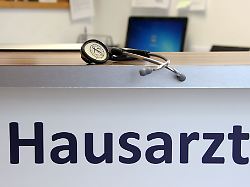Rescue through a mix of measures?
Ampel is working on a relief plan for the health system
March 26, 2024, 9:15 p.m
Listen to article
This audio version was artificially generated. More info | Send feedback
Longer waiting times, closures of medical practices, not enough young doctors: the healthcare network is strained in many places. The responsible ministry is now drawing up a draft with a mix of different measures to defuse the situation – and is receiving criticism.
Relief for general practitioners’ practices, new “health kiosks”, more transparency regarding health insurance services: According to the traffic light coalition’s legislative plans, local care for patients should be more secure. According to a draft from the Ministry of Health, people do not have the same opportunities everywhere in Germany to realize their rights to advice, prevention offers and care. Criticism comes from patient advocates, the opposition and health insurance companies.
Federal Health Minister Karl Lauterbach had already announced the legal plans after a meeting with medical representatives. Green health expert Janosch Dahmen said that this would finally mean an improvement in practice care and a strengthening of resident doctors. “Many medical practices are working at their limits.” The aging population suffers from this. “This is now evident when looking for specialist appointments in cities as well as in primary care in rural areas.” The overdue structural reforms should now under no circumstances be further delayed or even blocked in the cabinet.
General practitioners
Improvements are to be made for general practitioners in order to ensure “widespread care in the future,” as the draft states. Specifically, as with pediatricians, the upper limits on remuneration should be eliminated.
In addition, an annual “flat rate” is to be introduced for the treatment of chronically ill people who constantly receive medication. This is intended to avoid visits to the practice just to get a prescription and to create more freedom for treatment. A “holding fee” is also planned if practices meet certain criteria, for example for home and nursing home visits or opening times.
“Health kiosks”
Easily accessible advice centers for treatment and prevention should be able to be set up in regions and districts with many socially disadvantaged people – on the initiative of the municipalities, led by a nurse and in existing rooms or on buses.
Estimated annual cost per kiosk: 400,000 euros. 74.5 percent of this should be borne by statutory health insurance companies, 5.5 percent by private health insurance and 20 percent by the respective municipality. In 2025 there could be 30 kiosks nationwide, and then around 220 by 2028.
teenagers
According to the draft, psychotherapeutic offers for children and young people should also be improved. For this purpose, a new group of doctors should be formed to plan needs. This enables “more targeted control of branch options” for corresponding practices.
Young doctors
Funding is planned to provide more medical study places. The states are actually responsible – but in the future, two additional study places will be financed for every place financed by the state.
This is via a new fund that is to be fed from the liquidity reserve of the health fund – the money collection point of the statutory health insurance companies. The aim should be to permanently support up to 3,100 study places with 35,000 euros each per year.
transparency
A clear digital information and comparison offering is to be created for those with statutory health insurance and long-term care insurance, as the draft states. Numbers on approvals, rejections and objections to certain health insurance benefits should be available there – but also on processing times and the quality of advice and support offers.
Family medical care is currently at risk of collapse
The general practitioners’ association welcomed Lauterbach’s willingness to act. Otherwise, family medical care would collapse in the foreseeable future. In order to avoid this, the health insurance companies would have to raise the necessary money.
The German Foundation for Patient Protection doubted that an annual flat rate for practices for chronically ill people actually leads to fewer visits to the doctor. These patients have a wide variety of symptoms and don’t just come for prescriptions. “It is therefore obvious to seek medical advice more often throughout the year,” said board member Eugen Brysch.
Another problem is that there is a lack of accessibility by phone or email. The umbrella association of statutory health insurance companies criticized that it was primarily a “law to increase spending”. Financing universities is a core task of the state.
Elimination of fee limits and end to homeopathy at health insurance costs
The need of the hour is a fairer distribution of fees between the groups of doctors instead of an extra increase beyond the annual increases. According to the draft, the elimination of the fee limits alone is likely to lead to additional expenditure in the hundreds of millions. Left federal managing director Ates Gürpinar complained that it was not enough to better equip individual practices if there were too few practices, especially in financially weak districts.
Discussions are also emerging about another aspect – the end of homeopathy at health insurance costs announced by Lauterbach. FDP health expert Andrew Ullmann told the newspapers of the Bavaria media group that he was critical of the omission of a corresponding passage in the draft.
The ministry did not comment on the draft due to internal government discussions – but stated that Lauterbach was sticking to his plan to exclude homeopathic services and medicines as possible additional health insurance benefits. This will be the subject of further discussions in parliament, said a spokesman. 1800s
